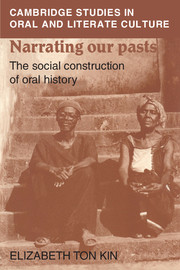Book contents
- Frontmatter
- Contents
- List of illustrations
- Acknowledgments
- Note on orthography
- Introduction
- 1 Jlao: an introductory case study
- 2 The teller of the tale: authors and their authorisations
- 3 Structuring an account: the work of genre
- 4 Temporality: narrators and their times
- 5 Subjective or objective? Debates on the nature of oral history
- 6 Memory makes us, we make memory
- 7 Truthfulness, history and identity
- Notes
- Bibliography
- General index
- Index of names
- Plate section
Introduction
Published online by Cambridge University Press: 05 June 2012
- Frontmatter
- Contents
- List of illustrations
- Acknowledgments
- Note on orthography
- Introduction
- 1 Jlao: an introductory case study
- 2 The teller of the tale: authors and their authorisations
- 3 Structuring an account: the work of genre
- 4 Temporality: narrators and their times
- 5 Subjective or objective? Debates on the nature of oral history
- 6 Memory makes us, we make memory
- 7 Truthfulness, history and identity
- Notes
- Bibliography
- General index
- Index of names
- Plate section
Summary
The argument
The past is myself, my own history, the seed of my present thoughts, the mould of my present disposition.
The words are R. L. Stevenson's, and they were borrowed by Christabel Bielenberg for the title of her autobiography, which describes her life in Germany between 1934 and 1945. These for her were central and dramatic years. She recalls a past which was ‘another country’ in more than one sense. She experienced Nazi Germany at first hand and she can tell outsiders what it was like from within, looking back on a world that has thankfully gone. But she was not formed by the same pasts that had moulded the people she came to live amongst. Her own background affected her perceptions and directed her actions, even as she also became involved in events in Germany that in turn would change and develop her too. Their effects would live on in her, the ‘seed of present thoughts’.
We can look at the past in different ways. To historians, the past is ‘another country’ which we can try to reconstruct from the traces left behind. If there are living survivors, they can be asked – or, as with Christabel Bielenberg, they can ask themselves – what their memories will yield about life in that different country.
- Type
- Chapter
- Information
- Narrating our PastsThe Social Construction of Oral History, pp. 1 - 17Publisher: Cambridge University PressPrint publication year: 1992
- 1
- Cited by

